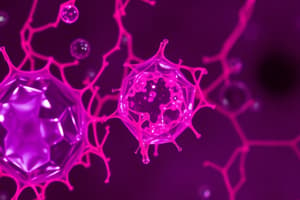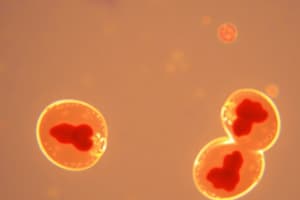Podcast
Questions and Answers
What is one of the key principles of the basic cell theory proposed by Schleiden and Schwann?
What is one of the key principles of the basic cell theory proposed by Schleiden and Schwann?
- All organisms are composed of one or more cells. (correct)
- Cells are identical in structure.
- All cells undergo photosynthesis.
- Cells can spontaneously generate.
Cell theory states that all cells arise from preexisting cells.
Cell theory states that all cells arise from preexisting cells.
True (A)
What does the Latin phrase 'Omnis cellula e cellula' translate to in English?
What does the Latin phrase 'Omnis cellula e cellula' translate to in English?
All cells come from cells
According to modern cell theory, all cells pass information from cell to cell during cell division using ______.
According to modern cell theory, all cells pass information from cell to cell during cell division using ______.
Match the following statements with their corresponding aspects of cell theory:
Match the following statements with their corresponding aspects of cell theory:
Who invented the first compound microscope?
Who invented the first compound microscope?
Robert Hooke was the first to observe bacteria using a microscope.
Robert Hooke was the first to observe bacteria using a microscope.
What did Matthias Schleiden conclude about plant tissues?
What did Matthias Schleiden conclude about plant tissues?
Rudolf Virchow added a third part to the ______ theory in 1855.
Rudolf Virchow added a third part to the ______ theory in 1855.
What term did Anton van Leeuwenhoek use to refer to single-celled organisms he observed?
What term did Anton van Leeuwenhoek use to refer to single-celled organisms he observed?
Match the scientist with their contribution:
Match the scientist with their contribution:
The Greek word 'bios' translates to ______.
The Greek word 'bios' translates to ______.
All animal organisms are composed of cells according to Theodor Schwann.
All animal organisms are composed of cells according to Theodor Schwann.
Flashcards are hidden until you start studying
Study Notes
Definition of Biology
- Biology is the study of life, derived from the Greek words "bios" (life) and "logos" (study).
Microscope Invention and Cell Discovery
- Zacharias Janssen invented the first compound microscope in 1595, with magnification of 3x to 9x.
- In 1665, Robert Hooke improved the microscope with 270x magnification, observing cork and coining the term "cellula" for the tiny compartments he saw.
- Anton van Leeuwenhoek, in 1673, used a homemade microscope to discover single-celled organisms in pond scum, calling them "animalcules," and observed blood cells from various animals.
Development of Cell Theory
- In 1838, Matthias Schleiden concluded that all plant tissues are composed of cells and that embryonic plants arise from a single cell.
- In 1839, Theodor Schwann established that all animal organisms are composed of cells, contributing to the foundational principles of cell theory.
- Key components of early cell theory:
- All organisms consist of one or more cells.
- The cell is the basic unit of structure for all organisms.
Contributions of Robert Remak and Rudolf Virchow
- Robert Remak observed cell division in animal cells in 1844 but faced skepticism.
- Rudolf Virchow published Remak’s findings in 1855, adding to cell theory that all cells originate from pre-existing cells, encapsulated in the phrase “Omnis cellula e cellula.”
Basic Components of Traditional Cell Theory
- All organisms are composed of one or more cells (Schleiden & Schwann, 1838-39).
- Cells are the basic unit of life in all living things (Schleiden & Schwann, 1838-39).
- Cells arise from pre-existing cells (Virchow, 1858).
Modern Cell Theory
- Modern Cell Theory includes the original three components plus additional statements:
- Cells transfer genetic information during division via DNA.
- All cells share a similar chemical composition and metabolic activities.
- Cells exhibit similar chemical and physiological functions (e.g., movement, digestion).
- Cell activities depend on the functions of organelles within the cell (e.g., nucleus, plasma membrane).
Studying That Suits You
Use AI to generate personalized quizzes and flashcards to suit your learning preferences.



